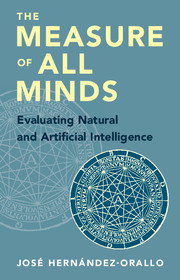Book contents
- Frontmatter
- Contents
- List of Panels
- Preface
- PART I A LONG-PONDERED OUTFIT
- PART II THE EVALUATION DISCORDANCE
- 3 The Evaluation of Human Behaviour
- 4 The Evaluation of Non-human Natural Behaviour
- 5 The Evaluation of Artificial Intelligence
- 6 The Boundaries against a Unified Evaluation
- PART III THE ALGORITHMIC CONFLUENCE
- PART IV THE SOCIETY OF MINDS
- PART V THE KINGDOM OF ENDS
- References
- Index
- Plate section
4 - The Evaluation of Non-human Natural Behaviour
from PART II - THE EVALUATION DISCORDANCE
Published online by Cambridge University Press: 19 January 2017
- Frontmatter
- Contents
- List of Panels
- Preface
- PART I A LONG-PONDERED OUTFIT
- PART II THE EVALUATION DISCORDANCE
- 3 The Evaluation of Human Behaviour
- 4 The Evaluation of Non-human Natural Behaviour
- 5 The Evaluation of Artificial Intelligence
- 6 The Boundaries against a Unified Evaluation
- PART III THE ALGORITHMIC CONFLUENCE
- PART IV THE SOCIETY OF MINDS
- PART V THE KINGDOM OF ENDS
- References
- Index
- Plate section
Summary
As investigators get smarter and invent new methods of investigation animals get smarter also.
– Thomas J. Bouchard Jr, Genes, Evolution and Intelligence (2014)THE TRADITIONAL DISTINCTION between humans and all the other living beings is symptomatic of the relevance of the Homo sapiens. However, this relevance led in the past to an anthropocentric stance, which has been, and still is, highly pernicious for many disciplines, such as biology. Comparative cognition and evolutionary psychology take a different perspective, with humans being the norm rather than the exception. The evaluation of behaviour is a fundamental tool in these disciplines, but the methodology and principles differ from human psychometrics. Is animal cognition so different from human cognition to justify a completely different evaluation methodology? And what about other living organisms, such as swarms and plants? Actually, when we move around the tree of life we find some awkward cases of adaptation, with an arguably minimal cognition ranging from the very small (bacteria) to the very big (ecosystems). Ultimately, we can further extend our cure for anthropocentrism to gaiacentrism as well, by thinking about extraterrestrial life. How are behavioural features evaluated in this highly diverse range of organisms?
THE BIOLOGICAL ROLE OF BEHAVIOURAL FEATURES
Juan Huarte developed Galen's purported view that the “rational powers” of men and other animals just differ in their degree: “Galen said that the difference which is found between man and brute beast is the selfe same which is found between a fool and a wise man; which is nought else than in respect of the more and the less. This (truly) is not to be doubted, that brute beasts enjoy memorie and imagination, and another power which resembles understanding, as the Ape is very like a man, and that his soule takes use of the composition of the braine, it is a matter apparant” (Huarte, 1575, pp. 29–30). However, this “apparent” gradation was only taken seriously when itwas seen in the context of the theory of evolution, three centuries later, epitomised by Charles Darwin's famous statement: “the mental powers of the higher animals do not differ in kind, though greatly in degree, from the corresponding powers of man” (Darwin, 1871, chap. XVIII). Even under an evolutionary perspective, this view was (and is still) not shared universally.
- Type
- Chapter
- Information
- The Measure of All MindsEvaluating Natural and Artificial Intelligence, pp. 93 - 116Publisher: Cambridge University PressPrint publication year: 2017



